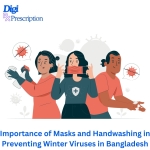
Importance of Masks and Handwashing in Preventing Winter Viruses in Bangladesh
As winter approaches in Bangladesh, respiratory infections like the flu, common cold, and Human Metapneumovirus (HMPV) become more prevalent. These viruses thrive in cooler weather and crowded settings, making preventive measures crucial to avoid outbreaks. Masks and handwashing are two simple but highly effective strategies to protect yourself and others from these seasonal illnesses.
Why Winter Viruses Spread Easily
Winter viruses spread through respiratory droplets and contaminated surfaces. Crowded areas, lack of ventilation, and close contact increase the risk of transmission. Key contributors include:
- Low humidity: Virus particles remain airborne longer in dry air.
- Close interactions: Schools, offices, and public transport make it easier for viruses to spread.
- Limited hygiene awareness: Many people neglect proper handwashing or mask usage.
The Role of Masks in Preventing Viral Infections
Masks act as a physical barrier, reducing the spread of respiratory droplets that carry viruses like the flu, HMPV, and RSV.
Benefits of Wearing Masks:
- Prevent droplet transmission: Masks stop droplets from entering your nose or mouth.
- Reduce asymptomatic spread: Many people with mild symptoms unknowingly spread viruses. Masks reduce this risk.
- Protection in crowded places: Markets, buses, and offices are common hotspots for virus transmission.
Types of Masks:
- Surgical masks: Affordable and effective for day-to-day protection.
- N95 or KN95 masks: Offer superior filtration, especially for high-risk individuals.
- Cloth masks: Suitable for everyday use, but ensure they are multi-layered and properly washed after each use.
The Power of Handwashing
Handwashing removes germs, including viruses, from your hands before they can enter your body or spread to others.
Steps for Proper Handwashing:
- Wet hands with clean, running water.
- Apply soap and lather all surfaces, including between fingers and under nails.
- Scrub hands for at least 20 seconds.
- Rinse thoroughly with water.
- Dry hands with a clean towel or air dry them.
When to Wash Your Hands:
- After coughing, sneezing, or blowing your nose.
- Before and after eating.
- After touching public surfaces like doorknobs or railings.
- Before touching your face.
Alternatives:
If soap and water are unavailable, use hand sanitizers containing at least 60% alcohol.
Combined Effectiveness: Masks + Handwashing
The combination of mask-wearing and regular handwashing significantly reduces the transmission of winter viruses:
- Masks block respiratory droplets.
- Handwashing removes viruses from your hands, reducing the risk of self-inoculation.
- Together, they break the chain of transmission, protecting both individuals and communities.
Challenges in Bangladesh
- Awareness: Many people are unaware of the importance of masks and handwashing.
- Accessibility: Limited access to clean water, soap, or quality masks in rural areas.
- Cultural habits: Hesitation to adopt practices like mask-wearing in non-pandemic scenarios.
Solutions:
- Public health campaigns to educate communities about hygiene.
- Distributing free or subsidized masks and hand sanitizers.
- Setting up handwashing stations in public areas like markets and schools.
Conclusion
Masks and handwashing remain among the most cost-effective and accessible ways to prevent winter viruses in Bangladesh. By adopting these practices, individuals can protect themselves and reduce the strain on healthcare systems during the busy winter months. Remember, staying informed and vigilant is key to combating seasonal respiratory illnesses.
Reliable Sources of Information
- World Health Organization (WHO): WHO Hygiene Practices
- Centers for Disease Control and Prevention (CDC): CDC on Respiratory Illness Prevention
- Directorate General of Health Services (DGHS), Bangladesh: DGHS Resources
- icddr,b: Infectious Disease Research in Bangladesh
